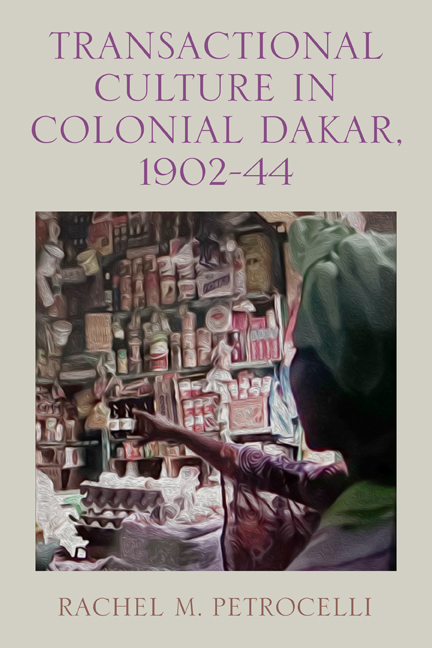Book contents
- Frontmatter
- Dedication
- Contents
- List of Illustrations
- Acknowledgments
- Introduction
- 1 Illusory Roots: Europeans, Autochthony, and Visions of a Capital City
- 2 The Rhetoric of Refoulement in Colonial Dakar
- 3 Challenges and Solutions of the Transient City
- 4 Impediments and Ingenuity in Financial Life
- 5 Ethnic Boundaries, Economic Niches, and Ambiguities in the Colonial City
- 6 The Lebanese and the Local in the Interwar Period
- 7 War’s Window: Urban Informality and Control
- Epilogue
- Bibliography
- Index
3 - Challenges and Solutions of the Transient City
Published online by Cambridge University Press: 08 May 2024
- Frontmatter
- Dedication
- Contents
- List of Illustrations
- Acknowledgments
- Introduction
- 1 Illusory Roots: Europeans, Autochthony, and Visions of a Capital City
- 2 The Rhetoric of Refoulement in Colonial Dakar
- 3 Challenges and Solutions of the Transient City
- 4 Impediments and Ingenuity in Financial Life
- 5 Ethnic Boundaries, Economic Niches, and Ambiguities in the Colonial City
- 6 The Lebanese and the Local in the Interwar Period
- 7 War’s Window: Urban Informality and Control
- Epilogue
- Bibliography
- Index
Summary
Residence and Transience
Despite colonial ambitions for a European city stabilized through segregation that privileged whites, the realities of Dakar included a flexible, fluid model of residence. Living in town was broadly conceived. City dwellers of diverse backgrounds adopted of a range of strategies—including varying degrees of mobility—in this regard. Transience became a mode of residence, and as Dakar evolved, transience became more expansively infused into various aspects of urban life. The nature of transience makes it inherently elusive, and locating it in various aspects of city life requires a close look into the spaces city dwellers occupied. In urban settings, the most prominent of those spaces were places of residence, which in the colonial capital also entailed places of work. City dwellers formulated creative residential strategies in which movement and transience were useful. Likewise, Dakar's diverse residential landscape developed many features that catered to mobility and its consequence, transience. The commonplace nature of transience in the city instilled a fragility into housing arrangements, including those that were at places of employment.
Dakar's main civil court cases provide a window into the sorts of considerations and dynamics that often were hidden from view yet integral to urban life in Dakar. As disputes arose, matters surfaced in the Tribunal that revealed how city dwellers formulated their approaches to residence and maintaining working situations. The records show a flexibility in the practices of Dakarois as they navigated their pragmatic arrangements. While the colonial administration attempted to draw clear lines between city dwellers and everyone who belonged in other areas of the territory, Africans in Dakar pursued their own strategies with little need to define urban residence in precise terms. Many considered themselves to be from elsewhere, but this had little bearing on the fact that they lived and worked in the capital as Dakarois.
The civil court cases that Dakarois lodged from the mid-1910s through the mid-1930s reveal a number of traits in the city's transactional culture around housing. First, the arrangements made between property owners and renters were devised as needed and with no parameters at an official level regarding renting. Second, the housing market consistently suffered from shortages.
- Type
- Chapter
- Information
- Transactional Culture in Colonial Dakar, 1902-44 , pp. 63 - 85Publisher: Boydell & BrewerPrint publication year: 2024



